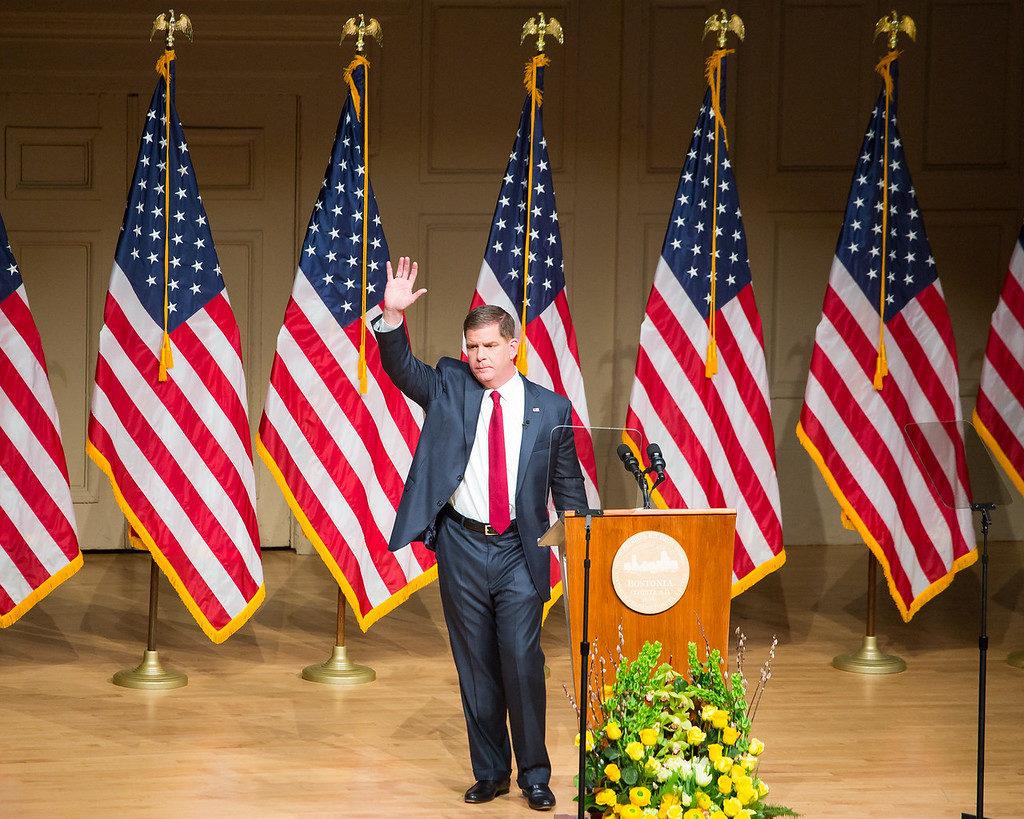By Alex Eng, deputy city editor
Mayor Martin J. Walsh discussed the city’s economy, education, housing and public safety policies Tuesday evening during his third annual State of the City address at Symphony Hall.
Walsh reaffirmed his commitment to fight gentrification after pledging to submit a package of bills protecting residents from displacement last week.
“Whatever your age, whatever your name, whatever your dream, you should be able to settle here,” he said.
The speech comes at the beginning of Walsh’s re-election campaign for the 2017 mayoral race. When City Councilor Tito Jackson announced his own mayoral bid last week, he criticized the city’s development goals that he said contribute to housing displacement and inequality.
“We are still listening, learning and leading, and because of our work, the state of our city is stronger than it’s ever been,” Walsh said before 2,500 people.
With new business growth, such as the move of General Electric’s headquarters to the city last August, Boston has embraced the global economy without sacrificing jobs, Walsh said.
“When we pitched Boston as world innovation leader, G.E. and many others responded. Our goal is more than new logos in the skyline. It’s good jobs and job training for all,” he said. “Employers are coming, and they are growing and they are hiring.”
Walsh said the city and state would invest $1 billion toward renovating schools over 10 years, and surplus funds from tourism taxes would be used to provide free pre-kindergarten schooling for every four year old in Boston.
“The gaps that remain come in the shapes of race, language and need,” he said. “I will file legislation to finally eliminate the opportunity gap in early education,” he said.
Following the November defeat of a statewide ballot measure to expand charter schools, Walsh also said charter schools could benefit public education. The measure lost with 38 percent voting in favor and 62 percent voting against.
“We need district schools and charter schools to learn from each other, not turn on each other,” he said.
Northeastern freshman business major Adam Sliwinski said that Walsh’s package of bills could actually worsen the effects of gentrification by disincentivizing business development.
“Investors will stop their investments, and supply of houses will be too small. Hence, rents will rise even more and the quality of housing will go down,” he said.
Walsh also said that Boston would continue working to ensure that all residents, regardless of identity, would feel safe. Preventative measures such as improving resources for addicts and homicide prevention were discussed, although Walsh did not provide specifics on public safety policy.
“To get there, we have to keep digging up the roots of violence and sowing seeds of opportunity,” he said. “We’re helping young people get the hope, the skill, and the jobs they need to leave the streets behind.”
Just three days before the inauguration of President-elect Donald J. Trump, who has been criticized for xenophobic, anti-immigration policies, Walsh upheld his positive position on immigration.
“Cities are also gateways for new Americans,” he said. “We don’t just welcome immigrants in Boston, we help them thrive, and we won’t retreat an inch.”
Undeclared freshman Ben Gelber said Walsh’s remarks were a reminder of Boston’s cultural values.
“Diversity, especially diversity from immigrants, is something we thrive on, and I think what the mayor’s saying is important to keep in mind, especially in light of the Trump-era rhetoric that alienates foreign born people,” he said.
Facing a mayoral challenger critical of his public record in City Councillor Tito Jackson, Walsh finished with a call for unity and continued progress.
“We’re fighters in Boston. We don’t know the word ‘impossible,” Walsh said. “But we didn’t win these victories by fighting against each other. We won them by fighting for each other.”
Photo by Dylan Shen






![A demonstrator hoists a sign above their head that reads, "We [heart] our international students." Among the posters were some listing international scientists, while other protesters held American flags.](https://huntnewsnu.com/wp-content/uploads/2025/06/image12-1200x800.jpg)








